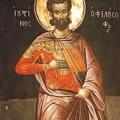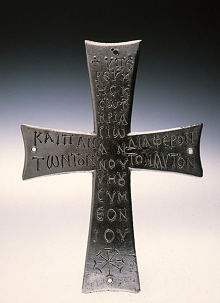101 - Father Figures: Introduction to Ancient Christian Philosophy
Posted on
Peter surveys Christian philosophy in the Roman empire, looking ahead to major figures like Origen and Augustine.
Themes:
Further Reading
• H. Bettenson, The Early Christian Church Fathers (Oxford: 1956).
• H. Bettenson, The Later Christian Church Fathers (Oxford: 1970).
• H. Chadwick, Early Christian Thought and the Classical Tradition: Studies in Justin, Clement and Origen (Oxford: 1966).
• B.D. Ehrman and A.S. Jacobs, Christianity in Late Antiquity 300-450 CE: a Reader (Oxford: 2004).
• G. Evans, The First Christian Theologians (Oxford: 2004).
• W.H.C. Friend, The Early Church (London: 1965).
• M. Ludlow, The Early Church (London: 2009).
• H.A. Wolfson, The Philosophy of the Church Fathers (1970).






Comments
Another great episode,
Another great episode, Peter!
And what most strikes me is how challenging to the common simplification of the history of philosophy the augustinian placement gets us to.
I shall confess that, even though I have a great appreatiation for your take on ancient philosophy so far, now I can see even more clearly the goal of your project.
And just out of curiosity: are you planning on going back to the political tension between pagan and christian philosophies and beliefs? If so, are you going to devote more space to the sources we have on Hypatia?
Regards!
In reply to Another great episode, by Flora
Pagans vs Christians
Hi, and thanks very much! I am going to look a bit at the pagan/Christian contrast, yes, though with these episodes I am going to look more at disputes within Christianity, e.g. concerning the Trinity and Incarnation, and also the battle with the Gnostics (which one could to some extent see as a dispute within Christianity, or at least, it isn't a straightforward Christians vs. pagans issue).
I don't think I will return to Hypatia except perhaps in passing; I don't have a lot to add to what I said in the "Last Pagans" episode. Frustratingly, we just don't know very much about her as a thinker (and what we know seems to concern more mathematics than philosophy). I am however going to emphasize the role of women in the late antique Christian tradition; for instance Macrina, sister of the Cappadocian fathers Basil and Gregory of Nyssa.
Elections
Please vote:
Those who think that it was a good idea, that Neoplatonism should be mixed with Christianity, press NC.
Those who do not, press C.
Thanks,
Joshua
There is no year 0, Peter:
There is no year 0, Peter: http://en.wikipedia.org/wiki/0_(year)
In reply to There is no year 0, Peter: by pixi666
Year 0
Yes, quite a few people have pointed this out. I've fixed it in the version that will be published in a book.
Thanks!
Peter
Thank you so much for posting
Thank you so much for posting about this here. I had almost given up my search to read The Early Christian Church Fathers written by one of my favorite priests, H. Bettenson. We need more people like him to save the face of our religion.
squash
i just thought i would mention that a squash, like a tomato, is also a fruit.
In reply to squash by morgan
Squash
Really? Thank goodness I'm not trying to do a podcast on botany, it would be a disaster. Thanks for the clarification.
In reply to Squash by Peter Adamson
yup. i'm not botanist either
yup. i'm not botanist either, but i do believe if it develops from the flower and contains seeds, it's a fruit.
In the beginning...
I’m delighted, Peter, that your remarkable project continues apace. As this post begins your section on the contribution of Christianity to the History of Philosophy, I’d very much like to know your take on the start of St. John’s Gospel, usually translated into English as “in the beginning was the Word, and the Word was with God, and the Word was God.” I recently looked at the original Greek text and it seems to pose some deep philosophical issues at the very outset of the Christian literary tradition. The most striking is that John repeatedly uses the word Logos where translations say ‘Word’. As you say yourself in this post (no.101, 16m12s), Logos is normally understood as Reason, and the Church fathers, presumably relying heavily on this text, speak much about Jesus being “the incarnation of divine wisdom and logos”. As a Classicist, I know that ‘logos’ has a vast spread of meaning - logical account, story, proportion, theory - and rarely means a ‘word’ as a unit of speech. So what is John really implying when he equates Logos with God? As you may recall, I am particularly interested in the presocratic philosopher Heraclitus: the world is in continuous flux and the Logos is the principle of reciprocal balance maintaining unity between opposites. Is it possible John was directly influenced by Heraclitus’ concept of a transcendent rational force overseeing and controlling the physical world? Or by any subsequent Greek philosopher who developed Logos as their prime force?
And then there’s the enigma of the relationship between the Logos and God. Logos comes first - ‘en archē’ - ‘in the beginning’ deliberately echoing the first two words of the Pentateuch, the book of Genesis translated into Greek. John’s second statement, that the word was ‘with God’, reads ‘pros ton Theon’. It appears that in no other Greek text does ‘pros’ plus the accusative case mean ‘with’. It is nearly always used after a verb of movement and means ‘to’, ‘towards’, even ‘against’.
Finally the wonderfully evocative “and the Word was God” was originally ‘kai theos ēn ho logos’, closer to “and god was the Logos”.
Apologies if you’ve already addressed this in one of your other talks. If so, just point me in the right direction!
In reply to In the beginning... by Stephen Kurt
Logos
Well, I'm no Biblical scholar so I wouldn't pretend to be able to give you a really good answer to this excellent set of questions. But for what it's worth I would say that Heraclitus is very unlikely as a source, I'd probably think more of the Stoics (who associate logos with their own god) as a possible philosophical background. I actually don't think a lingustic reading of logos here is that unlikely, though, as opposed to an abstract/cosmic notion of logos. If it means not a single word but a linguistic account, for instance, that would kind of make sense: that the revelatory message was already with God from the beginning.
In reply to Logos by Peter Adamson
Logos and Stoics
Thanks, yes, I was forgetting the Stoics. I must look into their concept of ‘logos’, with the help of your podcasts, of course!
101 - FATHER FIGURES: INTRODUCTION TO ANCIENT CHRISTIAN PHILOSOP
Hello Peter This 101 Podcast is précised to focus truth of god for psychological insight. Also feel justice philosophy's divinity. That the coolest. Shinji Tokida
(It's will)
I haven't had a misunderstanding like this before and it probably speaks to my accent instead of yours, but... I had to stop and wonder why they were debating about a "whale." I don't know, maybe you were throwing a new zoo animal at us!
In reply to (It's will) by Jordan
Will vs whale
Well, I do also believe that whales should be free!
Add new comment